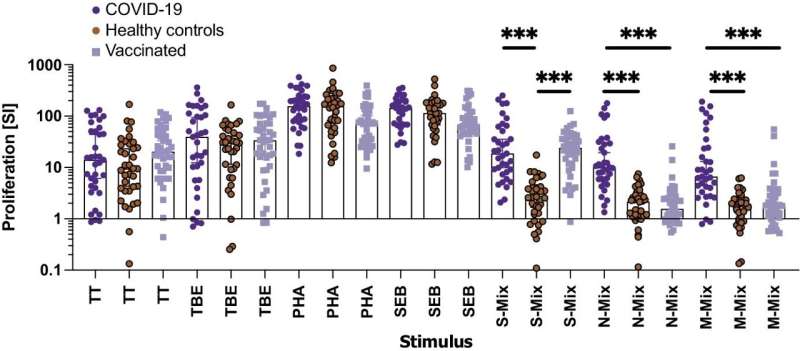New fast test discriminates between cellular immunity to SARS-CoV-2 after vaccination or infection

A MedUni Vienna research team has developed a new blood test that indicates a person's status of cellular immunity to SARS-CoV-2 within just 48 hours. This test is particularly relevant for vulnerable patient groups, whose own antibody response is not meaningful. The test can even indicate whether immunity is the result of vaccination against SARS-CoV-2 or of survived infection. The study data were recently published in Allergy.
The new test, developed by Bernhard Kratzer in a study conducted at MedUni Vienna's Center for Pathophysiology, Infectiology and Immunology under the leadership of Winfried Pickl and Rudolf Valenta, is based on the memory response of T cells to three different SARS-CoV-2 peptide mixtures. T cells are an important part of the specific cellular immune defense: they eliminate cells infected with SARS-CoV-2 and support antibody production by B cells. "Currently, it takes at least a week to perform and evaluate such T-cell tests, and the tests can only be performed in specialized laboratories. In contrast, our newly developed test is performed directly with a whole blood sample and can be evaluated after only 48 hours," explains study leader Winfried Pickl.
From September, the new test will be available at the Institute of Immunology at MedUni Vienna's Center for Pathophysiology, Infectiology and Immunology and is particularly useful for those who are unable to produce antibodies against SARS-CoV-2.
Discriminating between vaccinated and recovered
Analyses of blood samples from COVID-19-recovered patients, based on peptide mixtures of S-, M- and NC-proteins, enabled the research team to not only detect the two antiviral cytokines interleukin (IL)-2 and interferon-gamma in large quantities but also to identify the cytokine IL-13 as a marker for the highly specific T-cell immune response against SARS-CoV-2. IL-13 was previously known as a marker for allergic immune responses, but it apparently also plays a key role in establishing a long-lasting antibody response.
By using the three different peptide mixtures, it is also possible to discriminate between those who have been vaccinated against SARS-CoV-2 and those who have had COVID-19. Samples from recovered volunteers responded with significant cytokine production to all three peptide mixtures, whereas samples from vaccinated volunteers only responded to the specific peptide mixture in which the protein was induced by vaccination (S protein), and to which the vaccinated subjects then went on to build up cellular immunity. The novel test therefore allows a specific cellular immune response to SARS-CoV-2 to be identified even in individuals who, for various reasons, are unable to develop meaningful antibody responses.
T-cell immunity post infection is detectable longer than antibody responses
In the study, the T-cell response was also analyzed ten months after infection. It was found that the T-cell response was still as strong as that measured ten weeks after an infection. This is remarkable in that antibody levels in the blood have already dropped significantly ten months after infection. This long-lasting T-cell response may protect against severe disease in the event of re-infection with SARS-CoV-2.
The results of this study make a significant contribution to our understanding of the immune response to SARS-CoV-2 and will enable us to quickly establish whether specific individuals have built up cellular immunity to SARS-CoV-2.
More information: Bernhard Kratzer et al, Combined assessment of S‐ and N‐specific IL ‐2 and IL ‐13 secretion and CD69 neo‐expression for discrimination of post–infection and post‐vaccination cellular SARS‐CoV ‐2‐specific immune response, Allergy (2022). DOI: 10.1111/all.15406


















